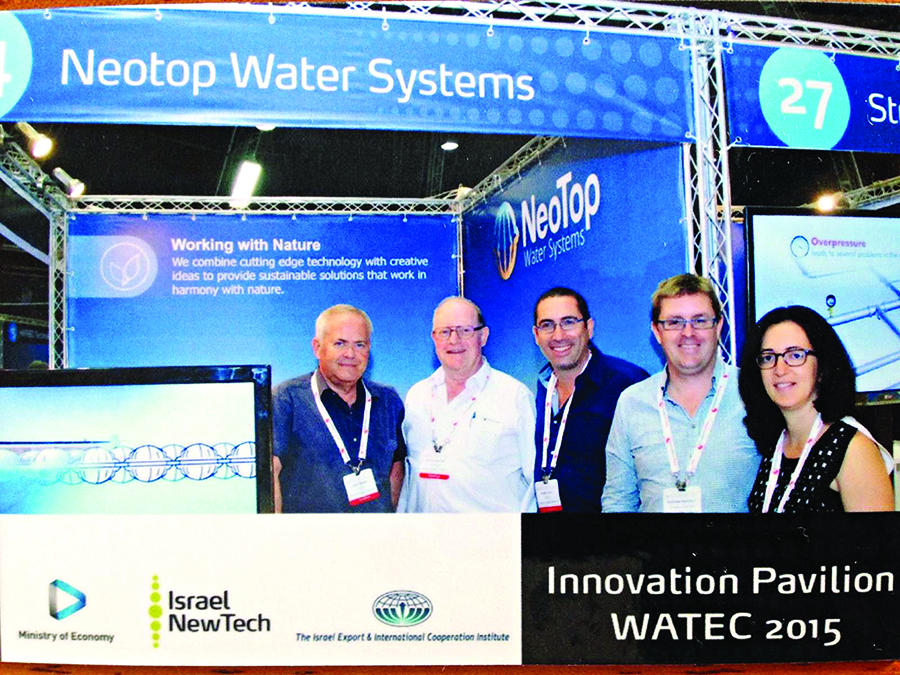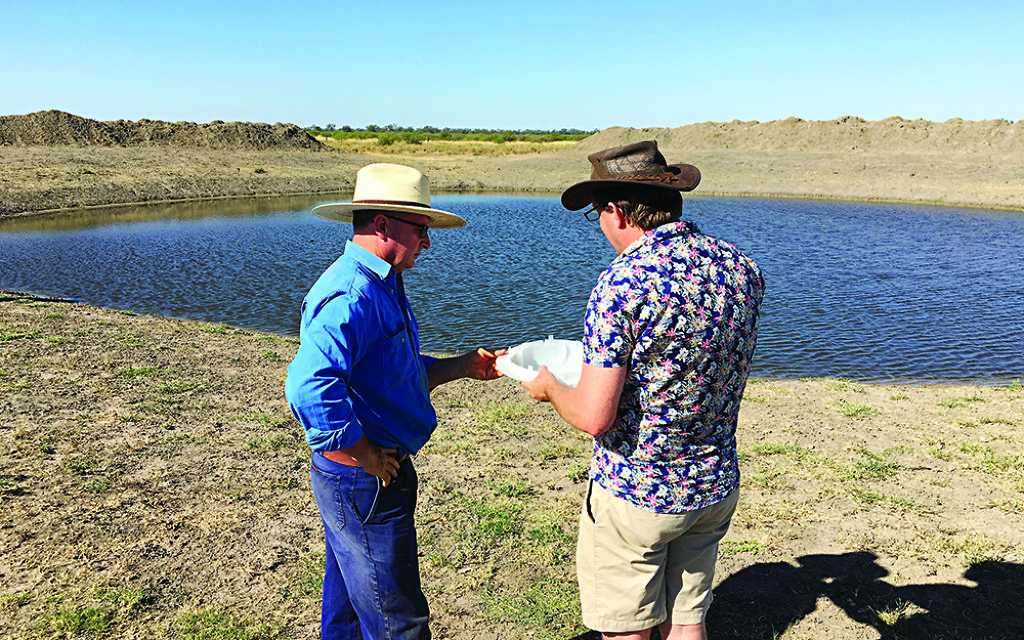How Israel is bringing water to the world
An Israeli start-up company is breaking new ground in the constant battle to conserve one of our planet’s most precious resources
It has been raining in Israel. Children don wellies; parents rush out to buy thermal underwear and umbrellas for every member of the family. Despite the power cuts and the disruption, winter weather is welcomed and celebrated in a country that is hot and dry nine months of the year. With several days of torrential rain, last month was Israel’s rainiest since 1992.
Yet despite the downpours, Israel remains chronically short of water. The level of Israel’s biggest reservoir, Lake Kinneret (also known as the Sea of Galilee), remains at 60cm below the emergency ‘red line’.
According to Dr Doron Markel, manager for Israel’s Water Authority, filling the lake to its brim would require an astonishing four metres of water. The 24cm that fell in December is, literally, a drop in the bucket.
Get The Jewish News Daily Edition by email and never miss our top stories Free Sign Up
But it’s not all bad news. In the past few years, Israel has made itself a world leader in the area of water conservation. Desalination plants went into operation at the same time the country reduced its demand for water by 17 percent. Israel reuses 86 percent of its water for agriculture, the highest percentage in the world (Spain is second with just 17 percent). Last month, a delegation of experts from the United States, Thailand and the United Nations took part in a special water solutions visit to investigate how Israel is developing novel ways to tackle water shortage.

Which leads me to the team of Brits, Israelis and an Australian behind one of Israel’s water-conservation start-ups. NeoTop Water Systems was the brainchild of Israeli technology whizz Zeev Birger, who five years ago came up with the idea of creating white plastic balls that could sit on the surface of a reservoir.
Their special design means they stop water evaporating from the reservoir and also cool it by up to nine degrees. Water rises and condenses inside each ball (think back to those precipitation diagrams in school geography lessons) and oxygen is released into the water. This makes the balls ideal for use in fish farms, where they deter harmful algae and also stop birds landing on the surface of the water.
Danny Handler, a London-based banking and finance expert, became NeoTop chairman and chief investor, funding the early research, and two years ago brought in a team including husband-and-wife duo Andrew Hamilton and Yael Grant as, respectively, Australia director and CFO, to commercialise NeoTop and sell its magic spheres not just in Israel but to the rest of the water-deprived world too. Shortly after, NeoTop won the prestigious Prime Minister’s Award for Entrepreneurship and Innovation.
Grant and Hamilton are just back from a month in Australia, where they carried out a pilot scheme for the cotton industry with the University of Southern Queensland. “The guy there is a world expert,” Hamilton tells me. “Australia has a boom-bust cycle with water. You can’t store water for more than a year or two, which has a serious impact on agriculture.”
Hamilton grew up in Sydney, but says he has a special affinity with the rural Australian communities. “I went to boarding school with kids from the country and spent many of my holidays on farms,” he says.
For Grant, the Australian outback is a far cry from where she grew up in Wembley. She qualified as a chartered accountant, but working in a tiny tech start-up like NeoTop has brought her close to her roots: parents Sidney and Esther Grant are both active as engineers in London.
The couple have no problems working side by side. “We work well together,” Grant says,of herself and Hamilton. “Being a husband-and-wife business couple is very normal in Australia, where many farmers are husband-and-wife teams. Our first sale is to a couple who have a store and run a farm.”
NeoTop has a pilot scheme running in Chile’s Atacama desert, another with American Water in California, and India is next. In Israel, NeoTop’s balls have been installed at the Sorek desalination plant, on a fish farm, and now in Eilat, where it is hoped they will protect the coral reef from the fierce summer heat.
As part of a fledgling start-up, every member of the team has to be hands-on, right down to clicking together thousands of white plastic
balls.
“We’re looking into automation but we’re not there yet. Yael holds the record in assembling (the balls),” Hamilton says.
As more areas of the world struggle to cope with water shortages, Israel’s technology start-ups hope to lead the way in providing a plentiful supply of the precious liquid.

Thank you for helping to make Jewish News the leading source of news and opinion for the UK Jewish community. Today we're asking for your invaluable help to continue putting our community first in everything we do.
For as little as £5 a month you can help sustain the vital work we do in celebrating and standing up for Jewish life in Britain.
Jewish News holds our community together and keeps us connected. Like a synagogue, it’s where people turn to feel part of something bigger. It also proudly shows the rest of Britain the vibrancy and rich culture of modern Jewish life.
You can make a quick and easy one-off or monthly contribution of £5, £10, £20 or any other sum you’re comfortable with.
100% of your donation will help us continue celebrating our community, in all its dynamic diversity...
Engaging
Being a community platform means so much more than producing a newspaper and website. One of our proudest roles is media partnering with our invaluable charities to amplify the outstanding work they do to help us all.
Celebrating
There’s no shortage of oys in the world but Jewish News takes every opportunity to celebrate the joys too, through projects like Night of Heroes, 40 Under 40 and other compelling countdowns that make the community kvell with pride.
Pioneering
In the first collaboration between media outlets from different faiths, Jewish News worked with British Muslim TV and Church Times to produce a list of young activists leading the way on interfaith understanding.
Campaigning
Royal Mail issued a stamp honouring Holocaust hero Sir Nicholas Winton after a Jewish News campaign attracted more than 100,000 backers. Jewish Newsalso produces special editions of the paper highlighting pressing issues including mental health and Holocaust remembrance.
Easy access
In an age when news is readily accessible, Jewish News provides high-quality content free online and offline, removing any financial barriers to connecting people.
Voice of our community to wider society
The Jewish News team regularly appears on TV, radio and on the pages of the national press to comment on stories about the Jewish community. Easy access to the paper on the streets of London also means Jewish News provides an invaluable window into the community for the country at large.
We hope you agree all this is worth preserving.
-
By Laurent Vaughan - Senior Associate (Bishop & Sewell Solicitors)
-
By Laurent Vaughan - Senior Associate (Bishop & Sewell Solicitors)
-
By Laurent Vaughan - Senior Associate (Bishop & Sewell Solicitors)
-
By Laurent Vaughan - Senior Associate (Bishop & Sewell Solicitors)






















